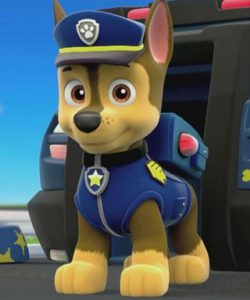From Katya: This week on 2020: the world is on fire, the internet is grappling with representations of police in the media. “Good” cops, “bad” cops, and… dog cops.
Paw Patrol is children’s television show featuring a group of cartoon dogs in various jobs. There’s a firefighter, a construction worker, and then there’s Chase, a German shepherd police officer. On June 6th, Paw Patrol tweeted one of the black “muted and listening” squares going around social media as part of #amplifiedmelanatedvoices. (There’s a whole controversy around this campaign as well, its purpose, and whether or not it was co-opted by the police and/or white supremacist groups but that’s another episode.) I don’t think they were planning for the response they received: “Defund Chase,” “Abolish Chase,” and “Chase is a class traitor.” It’s not really clear whether the tweets were serious, or to what extent, but there’s been enough Twitter backlash (and surprisingly high-profile news coverage) of the incident that we felt it was time to return to issues of cultural representation through the case of what is known as “copaganda.”
Copaganda, broadly speaking, describes media designed to make cops look good. This can be media releases from police or sheriff’s departments themselves highlighting, for instance, a charity food drive while remaining silent on police misconduct. It can look like police taking a knee alongside protesters (sometimes before using force against those same protesters.) Or it can be a feel-good show about policing like Brooklyn Nine-Nine that doesn’t, as Funké Joseph put it in his article on the show, “engage with what cops actually are.” Copaganda in the media downplays or erases the realities of police misconduct, militarization, and brutality. It gives people warm-fuzzies about a system founded on protecting the interests of slave-holders and the propagation of that sentiment through the media protects police institutions. Cops become the unquestionably “good” guys and anyone anti-cop becomes the “bad” guy because being anti-police goes against the grain of the dominant media order.
Even though many of the tweets against Chase the police dog are probably jokes, they aren’t fundamentally wrong either. As a children’s show, Paw Patrol exposes kids to positive experiences with cartoon representations of a variety of professions that gives them a lesson that those people are good: Marshall the firefighter saves people from fire, Marshall is good, therefore I should trust firefighters when they try to help me. The same applies to Chase: Chase is a good dog and a good cop on the show teaching children that police can be trusted. Chase is the proverbial Good Cop to brutality’s Bad Cop. The problem is that the Good Cop feelings towards Chase habituate kids to having those same feelings not only toward individual cops but towards the incredibly broken system and culture of policing itself. Now, I don’t see a crew of canines hosting a nuanced conversation about policing and race for six-year-olds anytime soon but it does beg the question of what the impact of these media representations are over the long term. For example, does growing up with Chase mean that children will be less prepared to face the reality of the U.S. police system when they are older?
We’ll get into copaganda and what exactly is up with this whole Paw Patrol situation more on the show. We want to know what you think about this situation. What is the importance of children’s media? What’s your experience with media that focuses on policing? How do films and television shows like Disney’s Zootopia that are actively aware of the problems with the U.S. police system fit into copaganda? Is Chase really the Good Cop the white parents of Twitter crave?






I swear, I have useful opinions that don’t involve kids. I swear I do.
My kid loves this show. We have a handful of the toys, and he knows all their names and they have adventures together all over the living room furniture. I look at a version of the banner pic above at least once a day.
It’s not kids or cartoons but I’d like to hear some talk about the cultural role of more nuanced/ambiguous/realist cop shows like The Wire. Is it doing something substantially different or is there no such thing as an anti-cop show? I don’t have many thoughts…looking forward to the show.
Chase is actually a detective his badge changed after the first season. Yes he is still a police dog but he is also a detective. Does this change the nerative on things…..?
This definitely extends beyond kids shows, as a conversation, but Copaganda is EVERYWHERE. Almost every show is a police procedural nowadays, and it’s always like “Cops are the good guys, whether they’re getting criminals, supernatural monsters, aliens, or whatever. They’re here to protect us.” It also exists in games, like the Resident Evil franchise is built around (early on in the franchise) that “The Police are here to investigate the evil pharmaceutical company turning everyone into Zombies.” The first 3 games largely feature cops, even though they find out the system is “corrupted” it plays into that whole “Well, they’re the good cops, and it’s these people on the Umbrella payroll who are the bad guys.”
There’s also the sibling of Copaganda, military propaganda with cartoons like G.I.Joe and the such where it’s just like “The military is here to protect us against the evil terrorists trying to blow up the moon.” (I’ve never actually watched G.I.Joe besides the funny dubbed after-episode special messages, but I assume that’s what happens in the show.)
Maybe I’m just rambling in these comments, apologies for that. I guess what I’m mostly saying is that all of these things sort of all play into it and a cultural brainwashing of society to “always trust cops”, even when there’s things that portray cops poorly, there’s always that lone “Jim Gordon” type that is there to hammer home the “Not All Cops/Few Bad Seeds” message.